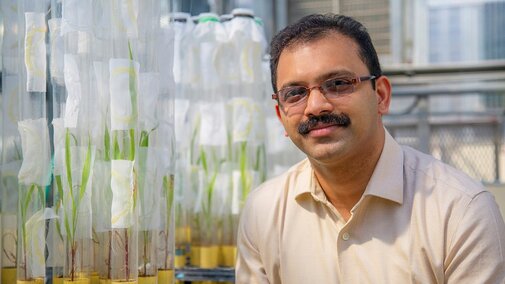A tiny invader’s gooey march through U.S. sorghum fields continues to devastate crop yields, forcing some farmers out of the sorghum business despite the crop’s increasing importance.
University of Nebraska–Lincoln entomologist Joe Louis is investigating ways to help sorghum naturally resist sugarcane aphids, the crop’s most damaging pest in the United States. Louis earned a five-year, $1.5 million Faculty Early Career Development Program award from the National Science Foundation to continue his research.
“Sorghum is one of the top five cereal crops grown in the world,” said Louis, Harold and Esther Edgerton assistant professor of entomology. “The sugarcane aphid is really damaging this critical crop, so developing novel strategies to control these insects would be beneficial.”
Sorghum, an important global food source, is growing in popularity because of its ability to withstand drought and heat, which are worsening under climate change. In the United States, the world’s largest producer of grain sorghum, the crop is grown primarily for animal feed and as a biofuel.
In 2013, sugarcane aphid populations unexpectedly proliferated in Texas and Louisiana, quickly spreading to other states and into Mexico. Aphids, which reproduce rapidly, feed on the plant’s leaves and stalks, depleting the plant’s nutrients. Aphids also produce a sticky “honeydew” that causes mold to build up on leaves and clogs harvesting equipment.
To investigate how sorghum might better defend itself against sugarcane aphids, Louis and his team looked to a special population of sorghum created from varieties found around the world. From this globally diverse population, the team identified plants that are more resistant to aphids, as well as those more susceptible to the pest.
Video: Joe Louis earns CAREER award
With this award, Louis will use a blend of molecular, biochemical and electrophysiological approaches to better understand the genetic basis of sorghum resistance to aphids, which will help him determine what makes one variety more resistant to pests than another. With this information, breeders and molecular biologists will be able to develop sorghum varieties with these naturally resistant traits.
“By promoting those innate plant defenses, we’re trying to reduce our dependence on toxic and harmful pesticides so we have a much cleaner and safer environment,” Louis said.
He anticipates that the information he uncovers will also provide insights into strategies to help other significant cereal crops, such as corn, wheat, rice and barley, which are also attacked by sap-sucking insects.
The award will also allow Louis to develop outreach projects. He said he’s excited to help teachers and students gain valuable research and related skills, as well as develop a deeper understanding of plant biology, genetics and entomology.
In one project, Louis is creating a program to bring teachers into the laboratory to gain research experience they can take back to their classrooms. In a second project, he’s developing a 10-week summer residence research program for underserved minority undergraduate students, principally from the University of Texas Rio Grande Valley. Finally, Louis will visit a Lincoln middle school to provide students with hands-on experience conducting plant-insect interaction experiments.
The prestigious NSF grant, known as a CAREER award, supports pre-tenure faculty who exemplify the role of teacher-scholars through outstanding research, excellent education and the integration of education and research. This CAREER project is jointly funded by NSF’s Plant Genome Research Program, part of the agency’s biological sciences directorate, and the Established Program to Stimulate Competitive Research, known as EPSCoR.

